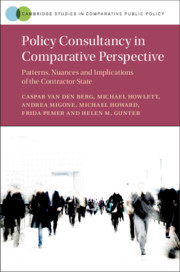 Policy Consultancy in Comparative Perspective
Policy Consultancy in Comparative Perspective Book contents
- Policy Consultancy in Comparative Perspective
- Cambridge Studies in Comparative Public Policy
- Policy Consultancy in Comparative Perspective
- Copyright page
- Contents
- Figures
- Tables
- Author Biographies
- Acknowledgements
- Abbreviations
- 1 Policy Consultancy in Comparative Perspective
- 2 Consultancy in the UK Government: Modernizing Privatism
- 3 Policy Consulting in the USA: Significant but in Decline?
- 4 Entrenched and Escalating: Policy-Relevant Consulting and Contracting in Australia, 1987–2017
- 5 From Corporatist to Contractor State? Policy Consulting in the Netherlands
- 6 Policy Consultants for Substance and Process: A Review of the Supply and Demand for Canadian Policy Consulting
- 7 Swedish Government Agencies’ Hiring of Policy Consultants: A Phenomenon of Increased Magnitude and Importance?
- 8 Conclusion: Policy Consulting in Comparative Perspective
- Book part
- References
- Index
8 - Conclusion: Policy Consulting in Comparative Perspective
Published online by Cambridge University Press: 09 December 2019
- Policy Consultancy in Comparative Perspective
- Cambridge Studies in Comparative Public Policy
- Policy Consultancy in Comparative Perspective
- Copyright page
- Contents
- Figures
- Tables
- Author Biographies
- Acknowledgements
- Abbreviations
- 1 Policy Consultancy in Comparative Perspective
- 2 Consultancy in the UK Government: Modernizing Privatism
- 3 Policy Consulting in the USA: Significant but in Decline?
- 4 Entrenched and Escalating: Policy-Relevant Consulting and Contracting in Australia, 1987–2017
- 5 From Corporatist to Contractor State? Policy Consulting in the Netherlands
- 6 Policy Consultants for Substance and Process: A Review of the Supply and Demand for Canadian Policy Consulting
- 7 Swedish Government Agencies’ Hiring of Policy Consultants: A Phenomenon of Increased Magnitude and Importance?
- 8 Conclusion: Policy Consulting in Comparative Perspective
- Book part
- References
- Index
Summary
Policy consulting, as pointed out in the Introduction to this book, is an important but under-researched topic in policy studies. Policy consultancy has been a problematic blind spot for scholars, politicians and other commentators who are concerned with the substantive and procedural quality of the policies that shape our societies, and it is a far more important and sizeable component of the work that happens within government than the literature currently acknowledges. However, many questions about the roles and activities of policy consultants remain shrouded in mystery. Many of these questions are comparative in nature but require nuanced analysis. That is, the use and role of policy consultancy needs to be understood in terms of the political-administrative culture and structures of a given national polity, but the use of policy consultants is unevenly distributed across types of policy organizations and policy sectors.
- Type
- Chapter
- Information
- Policy Consultancy in Comparative PerspectivePatterns, Nuances and Implications of the Contractor State, pp. 221 - 240Publisher: Cambridge University PressPrint publication year: 2019


